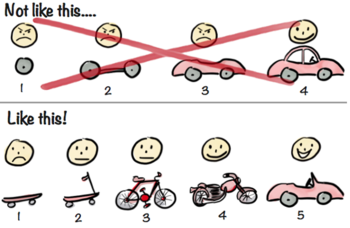Embarking on a big project? Start small to deliver fast.
A skateboard is a product of brilliant simplicity: a board and four wheels. At some point, you may need a car, but for now, it gets you where you are going, faster than your own two feet.
For Yale’s Operations team, one such skateboard is helping launch the first initiative of an ambitious multi-year strategy and build momentum for the next.
Operations, led by Jack Callahan, senior vice president for Operations, includes the departments of finance, information technology, public safety, human resources, facilities, hospitality, administration, New Haven affairs and University properties. Collectively, they partner with the school of medicine and other academic units across Yale to play a critical role in supporting the university’s complex enterprise.  Image of the skateboard theory attributed to Henrik Kniberg.
Image of the skateboard theory attributed to Henrik Kniberg.
Last year, the leadership team worked together to define a unified strategic vision to support their essential work, the pillars of which address the division’s priorities for the future: “Resourcing the Mission,” to ensure we have the funds, people, technology and facilities to realize the university’s mission; “Building a more effective operating model” that supports the campus everyday/all day and improves continuously over time; and “Workplace of Choice” to attract, develop and reward an excellent workforce with a commitment to diversity, equity, inclusion, and belonging.
The team identified three priorities, key cross-unit initiatives to advance this strategy – OneFinance, Recruiting and Learning.
With these guiding concepts in mind, they needed a concrete next step—a skateboard. In project management, the concept of a “skateboard” means focusing on the areas in which you can implement changes quickly, gain traction with users, and gather valuable feedback immediately, while laying the groundwork for something more elaborate.
For the operations team, the skateboard concept was a way to, “produce early value quickly, with the least amount of effort possible, and then drawing out practical learnings,” explained Callahan. “The goal is to test our solutions, learn, and make corrections as we go.”
The team quickly identified Workplace of Choice and, more specifically, recruitment as an area ripe for this approach. The result was the launch of the employee referral program (ERP), which incentivizes staff members to serve as recruitment ambassadors for the university. The ERP offers eligible staff a referral bonus of up to $2000 that is paid within 90 days of the candidate’s hire date. Since its inception, the ERP has resulted in 105 new employees.
With this initial skateboard launched and more underway, the team continues to look for ways to advance their work. “I am confident and excited about how Operations will support and help deliver on this mission,” said Callahan.
You, too, can use the skateboard concept in your work. This method can be applied to large and small projects like developing a new website or remodeling a research lab. To learn more about the “skateboard concept,” minimal viable product, and all its applications, start here.


